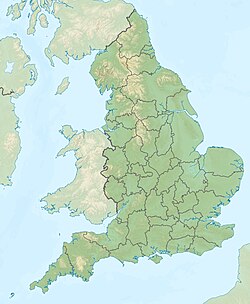
Back Bristol Afrikaans ብርስተል Amharic Bristón AN Bricgstow ANG برستل Arabic بريستول ARZ Bristol AST Bristol Azerbaijani بریستول AZB Bristol BAN
Bristol | |
|---|---|
| Motto(s): Virtute et industria (With courage and industry) | |
Location of city centre within county | |
| Coordinates: 51°27′13″N 02°35′51″W / 51.45361°N 2.59750°W | |
| Sovereign state | United Kingdom |
| Country | England |
| Region | South West |
| Royal charter | 1155[2] |
| County corporate | 1373 |
| City status by diocese creation | 1542 |
| Ceremonial county | 1996 |
| Status | City, county and unitary authority |
| Government | |
| • Type | Unitary authority |
| • Governing body | Bristol City Council |
| • Leader | Tony Dyer (Green) |
| • MPs | Carla Denyer (G) Kerry McCarthy (L) Darren Jones (L) Karin Smyth (L) Damien Egan (L) |
| Area | |
• City and county | 40 sq mi (110 km2) |
| Elevation | 36 ft (11 m) |
| Population (2023)[7] | |
• City and county | 483,000[1][1] (Ranked 10th district and 43rd ceremonial county) |
| • Density | 11,000/sq mi (4,248/km2) |
| • Urban | 707,412[6] |
| Demonym | Bristolian |
| Ethnicity (2021) | |
| • Ethnic groups | |
| Religion (2021) | |
| • Religion | List
|
| Time zone | GMT (UTC) |
| • Summer (DST) | UTC+1 (BST) |
| Postcode | |
| Area codes | 0117, 01275, 01454 |
| ISO 3166 code | GB-BST |
| GVA | 2017 |
| • Total | £21.2bn ($26.9bn) (4th) |
| • Growth | |
| • Per capita | £33,700 ($42,800) (4th) |
| • Growth | |
| Website | bristol |
 | |
| Click the map for an interactive fullscreen view | |
Bristol (/ˈbrɪstəl/ ⓘ) is a city, unitary authority area and ceremonial county in South West England, the most populous city in the region.[9][10] Built around the River Avon, it is bordered by the ceremonial counties of Gloucestershire to the north and Somerset to the south. The county is in the West of England combined authority area, which includes the Greater Bristol area (eleventh most populous urban area in the United Kingdom) and nearby places such as Bath.[7]
Iron Age hillforts and Roman villas were built near the confluence of the rivers Frome and Avon. Bristol received a royal charter in 1155 and was historically divided between Gloucestershire and Somerset until 1373 when it became a county corporate. From the 13th to the 18th century, Bristol was among the top three English cities, after London, in tax receipts. A major port, Bristol was a starting place for early voyages of exploration to the New World. At the height of the Bristol slave trade, from 1700 to 1807, more than 2,000 slave ships carried an estimated 500,000 people from Africa to slavery in the Americas. The Port of Bristol has since moved from Bristol Harbour in the city centre to the Severn Estuary at Avonmouth and Royal Portbury Dock.
The city's modern economy is built on the creative media, electronics and aerospace industries; the city-centre docks have been redeveloped as cultural and heritage centres. There are a variety of artistic and sporting organisations and venues including the Royal West of England Academy, the Arnolfini, Ashton Gate and the Memorial Ground (Bristol). The city has two universities; the University of Bristol and the University of the West of England (UWE Bristol). It is connected to the world by Bristol Airport; to the rest of the Great Britain via Bristol Temple Meads and Bristol Parkway mainline rail stations; by road by both the south-west to West Midlands M5 and the London to South Wales M4 (which connect to the city centre by the Portway and M32).
Bristol was named the best city in Britain in which to live in 2014 and 2017; it won the European Green Capital Award in 2015.
- ^ "How life has changed in Bristol: Census 2021". Office for National Statistics. 19 January 2023.
- ^ N. Dermott Harding. Bristol Charters 1155–1373 (PDF). Bristol Record Society. Archived (PDF) from the original on 9 October 2022. Retrieved 2 October 2021.
- ^ Bevis, Gavin (24 January 2020). "Is Rutland really England's smallest county?". BBC News Online. Retrieved 13 February 2022.
- ^ "Bristol". Encyclopædia Britannica. Retrieved 13 February 2022.
- ^ "Historical Weather for Bristol, England, United Kingdom". Weatherbase. Canty & Associates. Archived from the original on 4 March 2016. Retrieved 15 October 2015.
- ^ "Bristol Population 2024". Retrieved 11 February 2024.
- ^ a b "Mid-Year Population Estimates, UK, June 2022". Office for National Statistics. 26 March 2024. Retrieved 3 May 2024.
- ^ a b UK Census (2021). "2021 Census Area Profile – Bristol Local Authority (E06000023)". Nomis. Office for National Statistics. Retrieved 5 January 2024.
- ^ "The Lord-Lieutenant of the County & City of Bristol". The Lord-Lieutenant of the County & City of Bristol. Archived from the original on 22 October 2015. Retrieved 8 June 2015.
- ^ "The population of Bristol – bristol.gov.uk". www.bristol.gov.uk. Retrieved 11 February 2024.










